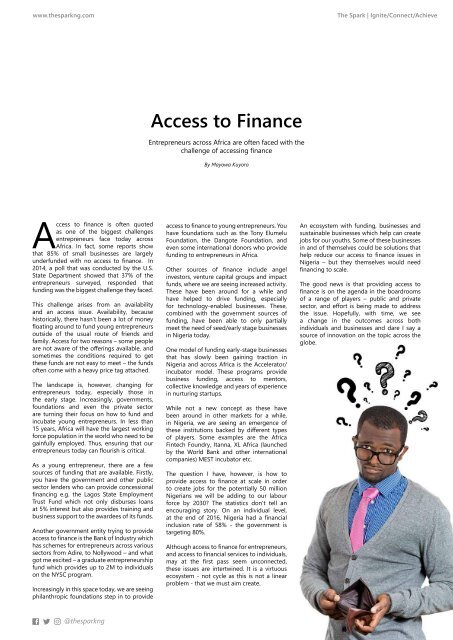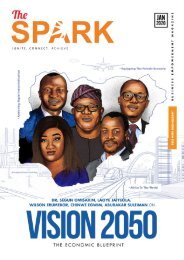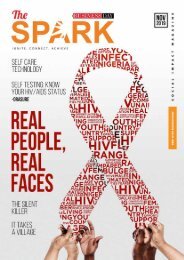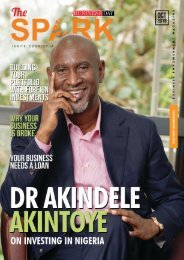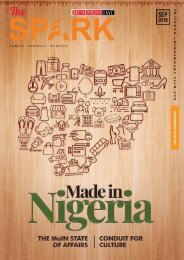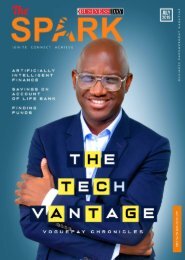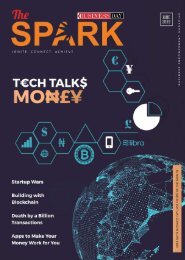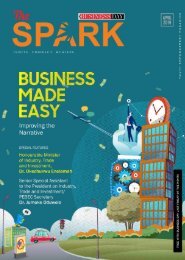Access To Diamonds
You also want an ePaper? Increase the reach of your titles
YUMPU automatically turns print PDFs into web optimized ePapers that Google loves.
www.thesparkng.com<br />
The Spark | Ignite/Connect/Achieve<br />
<strong>Access</strong> to Finance<br />
Entrepreneurs across Africa are often faced with the<br />
challenge of accessing finance<br />
By Mayowa Kuyoro<br />
<strong>Access</strong> to finance is often quoted<br />
as one of the biggest challenges<br />
entrepreneurs face today across<br />
Africa. In fact, some reports show<br />
that 85% of small businesses are largely<br />
underfunded with no access to finance. In<br />
2014, a poll that was conducted by the U.S.<br />
State Department showed that 37% of the<br />
entrepreneurs surveyed, responded that<br />
funding was the biggest challenge they faced.<br />
This challenge arises from an availability<br />
and an access issue. Availability, because<br />
historically, there hasn’t been a lot of money<br />
floating around to fund young entrepreneurs<br />
outside of the usual route of friends and<br />
family. <strong>Access</strong> for two reasons – some people<br />
are not aware of the offerings available, and<br />
sometimes the conditions required to get<br />
these funds are not easy to meet – the funds<br />
often come with a heavy price tag attached.<br />
The landscape is, however, changing for<br />
entrepreneurs today, especially those in<br />
the early stage. Increasingly, governments,<br />
foundations and even the private sector<br />
are turning their focus on how to fund and<br />
incubate young entrepreneurs. In less than<br />
15 years, Africa will have the largest working<br />
force population in the world who need to be<br />
gainfully employed. Thus, ensuring that our<br />
entrepreneurs today can flourish is critical.<br />
As a young entrepreneur, there are a few<br />
sources of funding that are available. Firstly,<br />
you have the government and other public<br />
sector lenders who can provide concessional<br />
financing e.g. the Lagos State Employment<br />
Trust Fund which not only disburses loans<br />
at 5% interest but also provides training and<br />
business support to the awardees of its funds.<br />
Another government entity trying to provide<br />
access to finance is the Bank of Industry which<br />
has schemes for entrepreneurs across various<br />
sectors from Adire, to Nollywood – and what<br />
got me excited – a graduate entrepreneurship<br />
fund which provides up to 2M to individuals<br />
on the NYSC program.<br />
Increasingly in this space today, we are seeing<br />
philanthropic foundations step in to provide<br />
access to finance to young entrepreneurs. You<br />
have foundations such as the <strong>To</strong>ny Elumelu<br />
Foundation, the Dangote Foundation, and<br />
even some international donors who provide<br />
funding to entrepreneurs in Africa.<br />
Other sources of finance include angel<br />
investors, venture capital groups and impact<br />
funds, where we are seeing increased activity.<br />
These have been around for a while and<br />
have helped to drive funding, especially<br />
for technology-enabled businesses. These,<br />
combined with the government sources of<br />
funding, have been able to only partially<br />
meet the need of seed/early stage businesses<br />
in Nigeria today.<br />
One model of funding early-stage businesses<br />
that has slowly been gaining traction in<br />
Nigeria and across Africa is the Accelerator/<br />
incubator model. These programs provide<br />
business funding, access to mentors,<br />
collective knowledge and years of experience<br />
in nurturing startups.<br />
While not a new concept as these have<br />
been around in other markets for a while,<br />
in Nigeria, we are seeing an emergence of<br />
these institutions backed by different types<br />
of players. Some examples are the Africa<br />
Fintech Foundry, Itanna, XL Africa (launched<br />
by the World Bank and other international<br />
companies) MEST incubator etc.<br />
The question I have, however, is how to<br />
provide access to finance at scale in order<br />
to create jobs for the potentially 50 million<br />
Nigerians we will be adding to our labour<br />
force by 2030? The statistics don’t tell an<br />
encouraging story. On an individual level,<br />
at the end of 2016, Nigeria had a financial<br />
inclusion rate of 58% - the government is<br />
targeting 80%.<br />
Although access to finance for entrepreneurs,<br />
and access to financial services to individuals,<br />
may at the first pass seem unconnected,<br />
these issues are intertwined. It is a virtuous<br />
ecosystem - not cycle as this is not a linear<br />
problem - that we must aim create.<br />
An ecosystem with funding, businesses and<br />
sustainable businesses which help can create<br />
jobs for our youths. Some of these businesses<br />
in and of themselves could be solutions that<br />
help reduce our access to finance issues in<br />
Nigeria – but they themselves would need<br />
financing to scale.<br />
The good news is that providing access to<br />
finance is on the agenda in the boardrooms<br />
of a range of players – public and private<br />
sector, and effort is being made to address<br />
the issue. Hopefully, with time, we see<br />
a change in the outcomes across both<br />
individuals and businesses and dare I say a<br />
source of innovation on the topic across the<br />
globe.<br />
@thesparkng<br />
15


